Find information about health and nutrition from various and reliable sources all over the world, in just one site. World's latest headlines all in one place.
Wednesday, February 28, 2018
After her son's death, mother details her journey to prevent future opioid addiction
From: http://www.cbsnews.com/video/after-her-sons-death-mother-details-her-journey-to-prevent-future-opioid-addiction/
An Australian tourist with measles may have exposed people in New York
From: http://www.cbsnews.com/video/an-australian-tourist-with-measles-may-have-exposed-people-in-new-york/
One mom's mission to find cure for son's rare disease
From: http://www.cbsnews.com/news/one-moms-mission-to-find-a-cure-for-her-sons-rare-disease/
Opioids webinar covers prescribing strategies for managing pain
From: https://www.ada.org/en/publications/ada-news/2018-archive/february/opioids-webinar-covers-prescribing-strategies-for-managing-pain
Canadian Finds Answers at Mayo Clinic Arizona
From: Mayo Clinic https://www.youtube.com/watch?v=reRgY9ILLOU
Flu Shot a Lifesaver for Heart Failure Patients
Researchers found that an annual flu vaccine reduced patients' risk of death by 50 percent during the flu season and by 20 percent during the rest of the year.
From: https://www.webmd.com/heart-disease/heart-failure/news/20180228/flu-shot-a-lifesaver-for-heart-failure-patients?src=RSS_PUBLIC
This Body Shape Can Raise Women's Heart Attack Risk
While obesity raises heart attack risk in both sexes, women with bigger waists and waist-to-hip ratios have greater odds for a heart attack than men who have a similar apple-shaped body, a large British study finds.
From: https://www.webmd.com/diet/obesity/news/20180228/this-body-shape-can-raise-womens-heart-attack-risk?src=RSS_PUBLIC
Statement for Rare Disease Day
Rare diseases present fundamentally different challenges from those of more common diseases, especially for diagnosis. The small number of patients, the logistics involved in reaching widely dispersed patients, the lack of validated biomarkers and surrogate end-points, and the lack clinical expertise and expert centres all present significant barriers.
From: http://www.who.int/entity/mediacentre/news/statements/2018/rare-disease-day/en/index.html
'Moderate' Cervical Lesions May Not Need Treatment
Moderate cervical lesions -- formally known as cervical intra-epithelial neoplasia grade 2 (CIN2) -- are abnormal cells on the surface of the cervix.
From: https://www.webmd.com/cancer/cervical-cancer/news/20180228/moderate-cervical-lesions-may-not-need-treatment?src=RSS_PUBLIC
Doctors "sound the alarm" about saline in IV bags
From: http://www.cbsnews.com/news/doctors-sound-the-alarm-on-possible-harms-of-saline-in-iv-bags/
Diesel Exhaust Might Raise Truckers' Odds for ALS
Jobs with a lot of diesel exhaust exposure include truck drivers, police officers, shipyard hands, construction workers, farm laborers and tool operators, as well as many people who work in an industrial setting.
From: https://www.webmd.com/brain/news/20180227/diesel-exhaust-might-raise-truckers-odds-for-als?src=RSS_PUBLIC
Despite risks, some moms-to-be keep smoking
From: http://www.cbsnews.com/news/1-in-14-pregnant-women-still-smokes-cdc-says/
Is adrenal fatigue “real”?
Low energy and tiredness are among the most common reasons patients seek help from a doctor. Despite being so common, it is often challenging to come up with a diagnosis, as many medical problems can cause fatigue. Doctors engage in detective work, obtaining a medical history, doing a physical exam, and doing blood tests. The results often yield no explanations. It can be frustrating for clinicians and patients when a clear-cut diagnosis remains elusive. An attractive theory, called adrenal fatigue, links stress exposure to adrenal exhaustion as a possible cause of this lack of energy.
But is adrenal fatigue a real disease?
The adrenals are two small glands that sit on top of the kidneys and produce several hormones, among them, cortisol. When under stress, we produce and release short bursts of cortisol into the bloodstream. The adrenal fatigue theory suggests that prolonged exposure to stress could drain the adrenals leading to a low cortisol state. The adrenal depletion would cause brain fog, low energy, depressive mood, salt and sweet cravings, lightheadedness, and other vague symptoms.
Numerous websites mention how to diagnose and treat adrenal fatigue. However, the Endocrinology Society and all the other medical specialties do not recognize this condition. The Endocrinologists are categorical: “no scientific proof exists to support adrenal fatigue as a true medical condition.” This disconnect between conventional and complementary medicine adds to the frustration.
A recent review of 58 studies concluded that there is no scientific basis to associate adrenal impairment as a cause of fatigue. The authors report the studies had some limitations. The research included used many different biological markers and questionnaires to detect adrenal fatigue. For example, salivary cortisol is one of the most common ordered tests used to make a diagnosis. The cortisol level, when checked four times in a 24-hour period, was no different between fatigued and healthy patients in 61.5% of the studies. The review raises questions around what should get tested (blood, urine, and/or saliva), the best time, how often, what ranges are considered normal, and how reliable the tests are, to name a few. In summary, there is no formal criteria to define and diagnose adrenal fatigue.
But what if I have symptoms of adrenal fatigue?
If you have tiredness, brain fog, lack of motivation, among other symptoms, you should first have a thorough evaluation with a medical doctor. Anemia, sleep apnea, autoimmune diseases, infections, other hormonal impairments, mental illnesses, heart and lung problems, and kidney and liver diseases are just some among many medical conditions that could cause similar symptoms. If the workup from your medical professional turns out normal and you believe you might have adrenal fatigue, I would recommend you consider a fundamental question: Why would your adrenals be drained? Take a better look at what types of stress might be affecting you. For many, the hectic pace of modern life is to blame.
The lack of a biological explanation can be disappointing. To make things worse, it’s not unusual for doctors to say “there is nothing wrong with you” or “this is all in your head.” The overwhelming amount of information on the Internet that recommends many types of treatment causes even more stress. Mental health conditions, such as depression or anxiety, may have symptoms similar to adrenal fatigue and may not respond well to antidepressants and counseling. And some patients do not believe that a mental health concern is the primary cause of their symptoms and many refuse medications due to concerns about their side effects.
So what’s a person to do?
Navigating this ocean of uncertainty is not an easy task. Symptoms associated with adrenal fatigue probably have multiple causes. Frequent follow-up visits and a strong patient-clinician partnership are critical elements for success. Alternative and complementary clinicians often have better results, because the appointments tend to last longer and they view patients through a more holistic lens. An important word of caution: some medical professionals prescribe cortisol analogs to treat adrenal fatigue. Cortisol replacement can be dangerous even in small doses. Unintended consequences can include osteoporosis, diabetes, weight gain, and heart disease.
Regardless of what we call it, there are millions of people suffering from similar symptoms, and a personalized plan that involves counseling, medications, supplements, lifestyle change, among others could work for many. Improvement following these programs is slow, and the evidence is weak, but I hope advances in big data, genomics and its the relationship with the environment and the microbiome, may shine a light on how to better help people who suffer from these ailments.
The adrenal fatigue theory may fit like a glove to explain your symptoms, which are very real. But before buying expensive protocols over the Internet to treat something we’re not even sure exists, take a deep dive and reexamine your lifestyle. The path to feeling better may be closer than you think.
The post Is adrenal fatigue “real”? appeared first on Harvard Health Blog.
From: Marcelo Campos, MD https://www.health.harvard.edu/blog/is-adrenal-fatigue-real-2018022813344
Jacksonville hosts 16th Give Kids A Smile event at local college
From: https://www.ada.org/en/publications/ada-news/2018-archive/february/jacksonville-hosts-16th-give-kids-a-smile-event-at-local-college
Tuesday, February 27, 2018
Hazmat situation at Virginia's Joint Base Meyer-Henderson Hall sends several to the hospital
From: http://www.cbsnews.com/video/hazmat-situation-at-virginias-joint-base-meyer-henderson-hall-sends-several-to-the-hospital/
Could heart-healthy diet also help with depression?
From: http://www.cbsnews.com/news/dash-heart-healthy-diet-may-also-help-with-depression/
How Much Salt Is in An IV? More Than You May Need
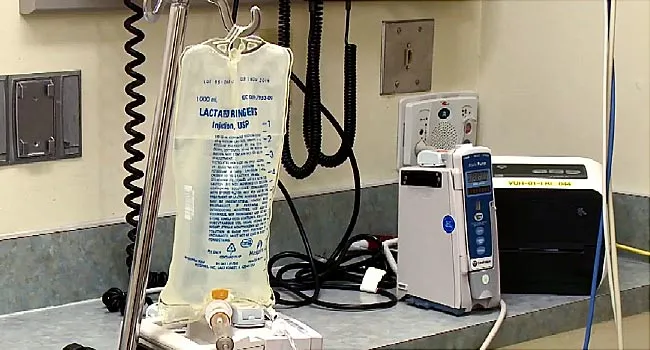
Those ubiquitous bags of saline have been around for more than a century. But some researchers now wonder if there are better, less salty, options.
From: https://www.webmd.com/a-to-z-guides/news/20180227/how-much-salt-is-in-an-iv-more-than-you-may-need?src=RSS_PUBLIC
How to Handle a Child's Picky Eating Phase
From: Eat Right https://www.youtube.com/watch?v=93IkJU8ydPs
Tackling Menopausal Sleep Problems From All Angles
Some hopeful news also emerged from the study: Many women with restless sleep and insomnia during menopause did not have sleep problems before or after menopause.
From: https://www.webmd.com/menopause/news/20180227/tackling-menopausal-sleep-problems-from-all-angles?src=RSS_PUBLIC
How Jim and Jeannie Gaffigan Found Humor in a Crisis
Last year, comedian Jim Gaffigan and his writer wife, Jeannie, faced a health crisis that nearly ended her life, derailed their family, and halted his career. But innovative technology -- and a little humor -- got them through.
From: https://www.webmd.com/a-to-z-guides/features/gaffigan-brain-tumor?src=RSS_PUBLIC
10 Questions for Bella Thorne
Bella Thorne answers questions about acting, her health, and what makes her happy.
From: https://www.webmd.com/a-to-z-guides/features/bella-thorne?src=RSS_PUBLIC
One Key Factor Raises LGBT Teens' Suicide Risk
Researchers looked at responses from 6,800 U.S. students in grades 9 through 12 who'd become sexually active, according to a CDC survey.
From: https://www.webmd.com/sex-relationships/news/20180227/one-key-factor-raises-lgbt-teens-suicide-risk?src=RSS_PUBLIC
'DASH' Diet May Also Help Lower Depression Risk
Those who followed the so-called DASH diet (Dietary Approaches to Stop Hypertension) were 11 percent less likely to develop depression than people who did not closely follow the diet.
From: https://www.webmd.com/diet/news/20180227/heart-healthy-dash-diet-may-also-help-lower-depression-risk?src=RSS_PUBLIC
Varicose Veins Tied to Higher Odds for Blood Clots
Varicose veins are a common condition affecting about 23 percent of American adults, the researchers said.
From: https://www.webmd.com/dvt/news/20180227/varicose-veins-tied-to-higher-odds-for-blood-clots?src=RSS_PUBLIC
New Legislative Action Center is live
From: https://www.ada.org/en/publications/ada-news/2018-archive/february/new-legislative-action-center-is-live
Amid bad flu season, FDA working on next year's vaccine
From: http://www.cbsnews.com/news/amid-nightmare-flu-season-fda-working-on-next-years-vaccine/
Tourist may have exposed New Yorkers to measles
From: http://www.cbsnews.com/news/australian-tourist-may-have-exposed-measles-new-york/
Electronic funds transfers may be wave of the future
From: By David Burger
https://www.ada.org/en/publications/ada-news/2018-archive/february/electronic-funds-transfers-may-be-wave-of-the-future-but-ada-is-helping
Female dentists, speakers ready to take spotlight at ADA 2018
From: By David Burger
https://www.ada.org/en/publications/ada-news/2018-archive/february/female-dentists-speakers-ready-to-take-spotlight-at-ada-2018
House passes Action for Dental Health bill
From: By Jennifer Garvin
https://www.ada.org/en/publications/ada-news/2018-archive/february/house-passes-action-for-dental-health-bill
4 tips for raising well-behaved children
Follow me on Twitter @drClaire
We all want our children to be well-behaved. We want our child to be the one who is kind, says “please” and “thank you,” does as he is told, and doesn’t get in trouble at school or bother kids at the playground. The problem, as any parent can attest, is that raising a well-behaved child is hard work.
Some of it is temperament — every child is different. Some children are rule-followers, and some of them, well, aren’t. But mostly it’s hard because it is an ongoing, exhausting process that requires that we always keep our eye on the ultimate goal (having a well-behaved child) rather than the short-term goal (such as having the screaming child in front of us stop screaming).
After more than 25 years of being both a pediatrician and a parent, here are four tips I think can make a big difference:
1. Start early. It may be cute when your toddler hits somebody, and they are unlikely to do much harm, but if you wait until preschool or later to be clear that hitting isn’t okay, it’s going to be harder. Your child will be justified in her confusion: if something has been fine up until now, why isn’t it fine anymore? The earlier you teach your child that hitting or biting isn’t okay, and that “no” actually means “no,” the better.
There is a big caveat to this, though: it’s important to understand where your child is developmentally. A toddler doesn’t hit to be mean; she hits out of frustration and anger, or sadness. A 2-year-old doesn’t throw a tantrum to get back at you or ruin your day; he is doing it for the same reasons a toddler hits. So as you start early, the idea is to help your young child understand good and bad ways of expressing those emotions. It’s also important to understand what your child is capable of; there is only so much we can ask of any child at each stage of development. When you go for well-child appointments, talk with your doctor about realistic expectations for behavior at your child’s age.
2. Be consistent. If jumping on the couch is fun, and sometimes Mommy and Daddy say no, but sometimes they let you, of course you are going to at least give it a try. But if you always say no, then your child learns the rules of the house and is less likely to jump on the couch. Once you’ve said no to something, it always needs to be no, which can be thoroughly exhausting — I understand that well. So pick your battles. Every family draws different lines in the sand. Any behavior that hurts someone (including hurting their feelings) or is dangerous should always be a no. And it’s good to teach children that certain settings (like religious services or public transportation, for example) require quieter, less active behavior — and to be respectful of others (being polite and sharing fall in there). But you can decide on the other rules. Maybe jumping on the couch is just fine in your house.
3. Be loving. Catch them being good, too. Be very positive about good behaviors or when they pull it together and stop a bad behavior. When a child behaves well, we tend to take it for granted or are simply relieved, but a child deserves kudos for following the rules, not just punishments when they don’t. It also makes a difference to spend time with your children and show them that you are invested in them. It puts discipline in a context and makes it easier and more worthwhile for children to behave well for you.
4. Set a good example. You can’t expect a child to say “please” and “thank you” if you don’t, or to treat others well if you don’t. Remember that children always pay way more attention to what we do than what we say. Just like Gandhi once said, “Be the change you want to see in the world.” Be the person you want your child to be.
If you are having a hard time, talk to your doctor. Some children have a tougher time than others, for all sorts of reasons; sometimes parents need help. Don’t be afraid to ask for help if you need it; it makes you a better parent when you do.
The post 4 tips for raising well-behaved children appeared first on Harvard Health Blog.
From: Claire McCarthy, MD https://www.health.harvard.edu/blog/4-tips-for-raising-well-behaved-children-2018022713404
Screen Teens For Depression Annually, Docs Say

The recommendation for universal screening is a change from the previous guidelines, published a decade ago, and is the first step in a larger strategy that should be followed when a doctor suspects a teenage patient might be depressed.
From: https://teens.webmd.com/news/20180227/screen-teens-for-depression-annually-docs-say?src=RSS_PUBLIC
Urine May Hold the Key to Your True Age
The test checks for a substance -- called a marker -- that indicates cellular damage from a process known as oxidation. The substance increases in urine as people get older.
From: https://www.webmd.com/a-to-z-guides/news/20180227/urine-may-hold-the-key-to-your-true-age?src=RSS_PUBLIC
Strong Tobacco Laws May Weed Out Vapers, Too
New York University researchers found that states with anti-tobacco regulations -- such as smoke-free air laws and cigarette taxes -- had fewer vapers as well as fewer cigarette smokers.
From: https://www.webmd.com/smoking-cessation/news/20180227/strong-tobacco-laws-may-weed-out-vapers-too?src=RSS_PUBLIC
Why the Flu Makes You Feel So Miserable
Most of influenza's misery is caused by the human body itself, or more precisely the immune system's response to the virus.
From: https://www.webmd.com/cold-and-flu/news/20180227/why-the-flu-makes-you-feel-so-miserable?src=RSS_PUBLIC
Monday, February 26, 2018
New guidelines for pediatricians aim to combat teen depression
From: http://www.cbsnews.com/video/new-guidelines-for-pediatricians-aim-to-combat-teen-depression/
New guidelines aim to help doctors recognize depression in teens
From: http://www.cbsnews.com/news/new-guidelines-aim-to-help-pediatricians-recognize-depression-in-teens/
Rare identical triplets born at Kansas City hospital
From: http://www.cbsnews.com/news/rare-set-of-identical-triplets-born-at-kansas-city-hospital/
Breast Cancer Radiation Not as Bad as Many Fear
The study of more than 300 women who underwent breast radiation found that almost half had heard "frightening" stories going into treatment. But only 2 percent ultimately agreed that the stories were true.
From: https://www.webmd.com/breast-cancer/news/20180226/breast-cancer-radiation-not-as-bad-as-many-fear?src=RSS_PUBLIC
15 Percent of Teens Say They've Sexted
Sexting between teenagers is increasing with the widespread use of camera-equipped smartphones and computers, said Sheri Madigan, lead researcher of the new report.
From: https://www.webmd.com/parenting/news/20180226/15-percent-of-teens-say-theyve-sexted?src=RSS_PUBLIC
Toxic Metals Found in E-Cigarette Vapor
The team found that e-liquid exposed to heating coils produced a vapor containing significant amounts of chromium, lead, manganese, nickel and zinc.
From: https://www.webmd.com/smoking-cessation/news/20180226/toxic-metals-found-in-e-cigarette-vapor?src=RSS_PUBLIC
In Mississippi, Dental Mission Week treats nearly 2,000 underserved residents
From: By Kimber Solana
https://www.ada.org/en/publications/ada-news/2018-archive/february/in-mississippi-dental-mission-week-treats-nearly-2000-underserved-residents
National Library of Medicine fellow visits ADA Library & Archives
From: https://www.ada.org/en/publications/ada-news/2018-archive/february/national-library-of-medicine-fellow-visits-ada-library-archives
Aetna CEO on acquisition by CVS, rising health care costs
From: http://www.cbsnews.com/news/cvs-aetna-acquisition-ceo-mark-bertolini/
Pediatrician arrested for giving partial vaccine doses; 500 kids possibly affected
From: http://www.cbsnews.com/news/pediatrician-arrested-for-giving-partial-doses-of-vaccines/
Mayo Clinic Minute: Lose weight by just standing
From: Mayo Clinic https://www.youtube.com/watch?v=gW7cDm0lAzc
Infectious Diseases A-Z: Measles cases surge in Europe
From: Mayo Clinic https://www.youtube.com/watch?v=52poPt3zpf8
Drug That Kills Flu in One Day Approved In Japan
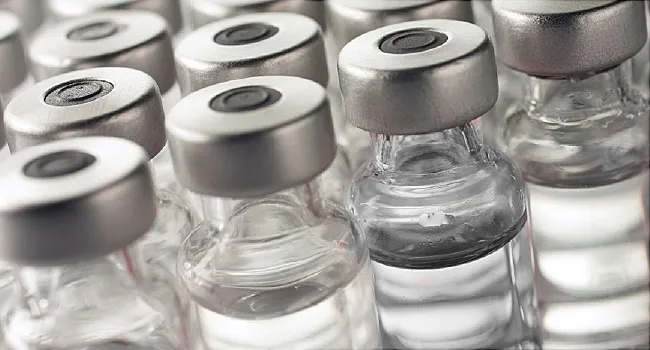
Unlike existing flu drugs, such as a Tamiflu, which require patients to take it twice-a-day for 5 days, the Japanese medication is taken in a single dose regardless of age the company said.
From: https://www.webmd.com/cold-and-flu/news/20180226/drug-that-kills-flu-in-one-day-approved-in-japan?src=RSS_PUBLIC
Active mind/body, healthy mind/body
Spring is just around the corner and if you’re ready to reboot one of your New Year’s resolutions, here’s why exercise should be at the top of the list. Current medical research continues to robustly establish vigorous physical exercise as a major influence on overall health and well-being, in addition helping in the treatment of many diseases including depression, cardiovascular disease, diabetes, and arthritis. A recent study found that regular, intense exercise beneficially influenced the action of 400 genes — that’s right, 400 genes, a huge number — that produce proteins increasing the healthy functioning of mitochondria, the energy-producing machinery inside every cell. Exercise is synergistic with medicines and surgery. Developing, undertaking, and maintaining an exercise regimen is one of the best steps a person can take toward a self-actualized style of medical care.
An exercise “prescription”
We are a physician couple who have been physically active all our lives. We prescribe exercise regularly in our practices (one of us is a neurologist, the other a psychiatrist) and approach it in exactly the same way that we approach prescribing a medication, informing patients of dose and frequency benefits, possible side effects, and mechanisms of action. We describe a concrete regimen of exercise rather than simply saying, “exercise” and leaving it at that. Many patients don’t know how to get started, and specific details about using machines, weights, running, and other techniques prove valuable. Practical details are important, and we take time to answer any and all questions a patient might have. The physician-patient partnership around overall health goals is crucial. As partners, they can work together to include exercise as one tool among many to help achieve good health.
Follow-up is also key to encourage continued elaboration of goals, to educate about the interventions, and to support motivation. An exercise regimen is not static, and for best effect changes organically over time.
We have also found it is important to describe our own exercise experience, as a way of modeling what is possible.
Here’s how we make room for exercise
We have discovered many techniques that help us maintain our exercise routines in the face of the daily demands of busy lives. Here is a partial list.
- On Sunday night, when you think about your week, schedule your exercise just as you plan for work, errands, and other commitments. It’s easier to stick with it when you have concretely planned time.
- Mix it up. Plan different types of exercise to challenge different muscle groups, as research shows us this is the best way to stay in shape and develop endurance and muscle mass.
- Don’t get bogged down if you don’t have a lot of time. Research has demonstrated that intense, short bursts of exercise can be as effective as a longer workout, perhaps more so.
- Get your heart rate up, but watch it recover to baseline too. Wearing some type of heart rate monitor can be helpful.
- Try something new. Winter is a great time to try cross-country skiing. In the summer, why not go for a kayak paddle? Everything physical that you do counts as exercise.
- Find an exercise buddy. That way, if you want to beg off, your partner can motivate you, and vice versa. Our cardinal rule is: never miss your exercise session!
- Consider a consult with a personal trainer. You don’t need to commit to the time or expense of regular meetings, but a one-time consult can be informative and motivating.
- Keep an exercise journal, at least at the start. You will be surprised when you concretely see how much progress you are making (be sure to set goals).
Do remember to get an okay from your PCP before you start. And one last thing — it never fails to motivate us that exercise can decrease your risk of developing cognitive impairment. That thought has us lacing up our running shoes and heading out the door every time. Hope we see you out there.
Sources
Enhanced Protein Translation Underlies Improved Metabolic and Physical Adaptations to Different Exercise Training Modes in Young and Old Humans. Cell Metabolism, March 2017.
Three Minutes of All-Out Intermittent Exercise per Week Increases Skeletal Muscle Oxidative Capacity and Improves Cardiometabolic Health. PLOS One, November 2014.
In a new online course from Harvard Health Publishing, Starting to Exercise, today’s leading fitness instructors show you workouts that work…the exercises that will help you enjoy a healthier, more vigorous, and longer life. You can access Starting To Exercise on your smart phone, tablet, or desktop computer. With easy log-in and simple-to-navigate screens, this online course is designed for adults of all ages.
The post Active mind/body, healthy mind/body appeared first on Harvard Health Blog.
From: Carolyn A. Bernstein, MD, FAHS https://www.health.harvard.edu/blog/active-mind-body-healthy-mind-body-2018022613327
Defib Device Boosts Cardiac Arrest Survival Rate
The American Heart Association says that of the more than 350,000 cardiac arrests that occur outside of U.S. hospitals each year, more than 100,000 occur outside the home
From: https://www.webmd.com/heart-disease/news/20180226/defib-device-boosts-cardiac-arrest-survival-rate?src=RSS_PUBLIC
Two Healthy Diets Equally Good for Your Heart
On either diet, participants lost about 3 pounds of body fat and about 4 pounds of weight overall. They also had similar decreases in body mass index (BMI), an estimate of body fat based on height and weight.
From: https://www.webmd.com/heart/news/20180226/two-healthy-diets-equally-good-for-your-heart?src=RSS_PUBLIC
Aetna CEO on proposed $69 billion acquisition by CVS
From: http://www.cbsnews.com/video/aetna-ceo-on-proposed-69-billion-acquisition-by-cvs/
Concerns over health effects of vaping - and rising use among teens
From: http://www.cbsnews.com/news/vaping-health-effects-rising-use-among-teens/
Researchers raise concerns about teens and vaping
From: http://www.cbsnews.com/video/researchers-raise-concerns-about-teens-and-vaping/
Sunday, February 25, 2018
A Conversation with Crystal Jackson and Dr. Fran Cogen: Part 1
Recently, our Safe at School Director, Crystal Jackson, got the chance to chat with Fran Cogen, MD, CDE, Director of Diabetes Services and Interim Co-Chief of Pediatric Endocrinology at Children’s Hospital. Dr. Cogen’s practice serves approximately 1,800 patients in the DC/Maryland/Virginia metro area, with 85 percent of those patients living with type 1 diabetes. Dr. Cogen has been working with diabetes patients since 2002 and is also a member of the ADA’s Safe at School Working Group. Crystal and Dr. Cogen spoke about the Safe at School program, diabetes management in schools and how parents can work with schools as a team—check out part one of this interview series that will be helpful to parents, diabetes providers and school staff.
Crystal Jackson: Most of [your patients] are school age. What are some common school diabetes care complaints that you hear from parents?
Fran Cogen, MD, CDE: Let’s start with insulin—sometimes, private schools may refuse to give insulin at school (but that’s happening less and less). Another concern is independence of the student. Many school nurses insist that students go to the clinic to check blood glucose or to receive other diabetes care. Students then often miss class time. That also goes for insulin pumps—some of the nurses feel that the students are not capable of bolusing on their own. In addition, some schools refuse to give glucagon…even if (in some cases) a child is seizing, they call 911 and give glucose gel. Other schools insist that every time the healthcare provider OR the parent/caregiver makes an insulin dose adjustment, we have to send new orders, which is impractical and can result in delaying an insulin dose and the child being able to eat lunch with classmates. Many school nurses take the position that they will not accept parental permission for insulin dose adjustment and require written orders from the student’s provider. This is unnecessary. Parents and self-managing students adjust insulin doses all of the time without input from the child’s provider.
CJ: What is your feeling about the need for provider authorization to make changes? What do you base that change on; for example, do you know what the child has been up to that day?
FC: I don’t personally know the latest insulin adjustments made by the family, but what we do (at least on the Maryland school form) is give permission to adjust the insulin-to-carb ratio at a certain range, and we give them permission to adjust the correction factor to a certain range…a responsible parent is best positioned to make these adjustments.
CJ: Going back to insulin, you mentioned that some of the private schools don’t have anybody to give insulin?
FC: Some schools don’t have nurses. [In those cases,] We ask that they delegate and train a school employee to give insulin—we haven’t seen many problems with that as of late. Of course, with some day care situations, that may be an issue.
CJ: What about public schools in the D.C. area?
FC: I haven’t heard any issues with the public schools in the area giving shots or using pens—what I am hearing are issues with the insulin pumps. They’re not comfortable letting the children manage them. For example, I recently got a call from one family whose child is perfectly capable of adjusting pump settings, and the child was low and knew what to do, but the nurse was trying to change the basal rates which she had no experienced in how to change. The father was very angry and ended up meeting with the principal.
CJ: What do you think could help to address a situation like that?
FC: It is my personal belief that we want someone trained and experienced to handle insulin pumps. Many school nurses—unless they’re insulin pump nurses—usually do not have that experience. I can understand if there’s a problem and [the school] wants to go over it with the parents on the phone, but I don’t feel it’s appropriate for a nurse to be changing pump basal rates, or changing infusion sites if they fall out in school unless they have training, experience and are comfortable with doing so. I don’t want someone who has little experience changing basal rates and replacing infusion sets basal rates in school, especially with the back-up option of giving insulin injections by pen or syringe.
Interested in learning more about our Safe at School program? Check out our resources here.
From: American Diabetes Association http://diabetesstopshere.org/2018/02/23/a-conversation-with-crystal-jackson-and-dr-fran-cogen-part-1/
"Moral obligation" to wipe HPV off the face of the planet
From: http://www.cbsnews.com/video/moral-obligation-to-wipe-hpv-off-the-face-of-the-planet/
The war on opioids moves to the courtroom
From: http://www.cbsnews.com/news/the-war-on-opioids-moves-to-the-courtroom/
The opioid epidemic: Taking Big Pharma to court
From: http://www.cbsnews.com/video/the-opioid-epidemic-taking-big-pharma-to-court/
The war on opioids moves to the courtroom
From: http://www.cbsnews.com/news/the-war-on-opioids-moves-to-the-courtroom/
The opioid epidemic: Taking Big Pharma to court
From: http://www.cbsnews.com/video/the-opioid-epidemic-taking-big-pharma-to-court/
Saturday, February 24, 2018
Women's Heart Health: Mayo Clinic Radio
From: Mayo Clinic https://www.youtube.com/watch?v=_JjDuckbZNk
Steam Treatment for Benign Prostatic Hyperplasia: Mayo Clinic Radio
From: Mayo Clinic https://www.youtube.com/watch?v=bpuXaeOUB1s
Well Living Lab Results: Mayo Clinic Radio
From: Mayo Clinic https://www.youtube.com/watch?v=tCq98BtMIY0
Why spreading the word about HPV risks in men has become this man's mission
From: http://www.cbsnews.com/news/one-mans-fight-to-raise-awareness-about-hpv-in-men/
Spinning: Good for the heart and muscles, gentle on joints
As part of my 2018 fitness goals, I have resolved to spend two days a week in what I playfully call “the pain cave.”
No, it’s not a setting for Game of Thrones, but one of the most challenging (and rewarding) workouts I have ever tried: spinning, also known as indoor cycling.
Spinning classes are staples at most gyms, and there are even entire fitness centers devoted to nothing but spinning. A class typically lasts 45 minutes to an hour and is led by an instructor who guides everyone through a series of heart-pumping workouts. For instance, you might do speed work, where you pedal fast for brief periods followed by periods of rest and recovery. You also may do incline workouts, where you increase the resistance so it feels like you are cycling uphill.
If you haven’t tried spinning — or are looking for a way to liven up your exercise routine — you should give it a whirl, as it offers a wide range of benefits for people of all ages and fitness levels.
“Spinning is a great cardiovascular workout and can help build lower-body muscle strength,” says Greg Robidoux, a physical therapist with the Cycling Medicine Program at Harvard-affiliated Spaulding Rehabilitation Network.
It’s also perfect for people who don’t enjoy, or have difficulty doing, higher-impact cardio activities like running. Spinning is a low-impact exercise that places less stress on your joints, which makes it ideal for older adults with knee or hip issues or those recovering from orthopedic injuries.
Spinning classes are safe for most people, but get your doctor’s okay, especially if you have a heart problem or are recovering from an injury or surgery. “Once you are more comfortable on the bike, you easily can do your own workouts,” says Robidoux. “But you should experience several classes to get a feel for everything before going solo.”
Guidelines for a safe and effective workout
Look for proper credentials. Most spinning instructors are certified to teach spinning. Others may be only certified to teach aerobics, and while they may be experienced with spinning, they might be less knowledgeable about the equipment and how to move smoothly through different positions on the bike. Robidoux says to look for instructor certifications like Mad Dogg Spinning Instructor Certification, AFAA [Aerobics and Fitness Association of America], Indoor Cycling Certification, or Schwinn Indoor Cycling Certification.
Get fitted. Ask your instructor how to adjust the handlebar and seat height and position to ensure proper alignment, so you don’t put too much strain on your lower back and knees. Your legs should move in a circle with no jackhammer-like bouncing.
Take it easy at first. Only pedal at a pace that allows you to stay stable in the saddle, and never feel you have to do what everyone else is doing. “Go at a lower intensity if needed, stay in your comfort zone, and progress at your own pace,” says Robidoux. “It is perfectly fine to skip a workout, recover, and jump back in when you are ready, or do your own thing and just pedal.”
Keep it short. It’s okay to stay for only 20 or 30 minutes of a class at first, until you are more comfortable and your endurance increases.
Don’t forget a towel and water. You will sweat, so always have a towel handy to wipe your brow and a water bottle to stay hydrated.
Sit right. Also, invest in a pair of cycling shorts, which can make sitting on the saddle more comfortable.
The post Spinning: Good for the heart and muscles, gentle on joints appeared first on Harvard Health Blog.
From: Matthew Solan https://www.health.harvard.edu/blog/spinning-heart-joints-2018022413237
WHO: Nurses and midwives: key to universal health coverage
From: World Health Organization https://www.youtube.com/watch?v=WzQ2HVrrGQk
Friday, February 23, 2018
Deadly flu season has likely peaked, CDC says
From: http://www.cbsnews.com/video/deadly-flu-season-has-likely-peaked-cdc-says/
A Conversation with Crystal Jackson and Dr. Fran Cogen: Part 1
Recently, our Safe at School Director, Crystal Jackson, got the chance to chat with Fran Cogen, MD, CDE, Director of Diabetes Services and Interim Co-Chief of Pediatric Endocrinology at Children’s Hospital. Dr. Cogen’s practice serves approximately 1,800 patients in the DC/Maryland/Virginia metro area, with 85 percent of those patients living with type 1 diabetes. Dr. Cogen has been working with diabetes patients since 2002 and is also a member of the ADA’s Safe at School Working Group. Crystal and Dr. Cogen spoke about the Safe at School program, diabetes management in schools and how parents can work with schools as a team—check out part one of this interview series that will be helpful to parents, diabetes providers and school staff.
Crystal Jackson: Most of [your patients] are school age. What are some common school diabetes care complaints that you hear from parents?
Fran Cogen, MD, CDE: Let’s start with insulin—sometimes, private schools may refuse to give insulin at school (but that’s happening less and less). Another concern is independence of the student. Many school nurses insist that students go to the clinic to check blood glucose or to receive other diabetes care. Students then often miss class time. That also goes for insulin pumps—some of the nurses feel that the students are not capable of bolusing on their own. In addition, some schools refuse to give glucagon…even if (in some cases) a child is seizing, they call 911 and give glucose gel. Other schools insist that every time the healthcare provider OR the parent/caregiver makes an insulin dose adjustment, we have to send new orders, which is impractical and can result in delaying an insulin dose and the child being able to eat lunch with classmates. Many school nurses take the position that they will not accept parental permission for insulin dose adjustment and require written orders from the student’s provider. This is unnecessary. Parents and self-managing students adjust insulin doses all of the time without input from the child’s provider.
CJ: What is your feeling about the need for provider authorization to make changes? What do you base that change on; for example, do you know what the child has been up to that day?
FC: I don’t personally know the latest insulin adjustments made by the family, but what we do (at least on the Maryland school form) is give permission to adjust the insulin-to-carb ratio at a certain range, and we give them permission to adjust the correction factor to a certain range…a responsible parent is best positioned to make these adjustments.
CJ: Going back to insulin, you mentioned that some of the private schools don’t have anybody to give insulin?
FC: Some schools don’t have nurses. [In those cases,] We ask that they delegate and train a school employee to give insulin—we haven’t seen many problems with that as of late. Of course, with some day care situations, that may be an issue.
CJ: What about public schools in the D.C. area?
FC: I haven’t heard any issues with the public schools in the area giving shots or using pens—what I am hearing are issues with the insulin pumps. They’re not comfortable letting the children manage them. For example, I recently got a call from one family whose child is perfectly capable of adjusting pump settings, and the child was low and knew what to do, but the nurse was trying to change the basal rates which she had no experienced in how to change. The father was very angry and ended up meeting with the principal.
CJ: What do you think could help to address a situation like that?
FC: It is my personal belief that we want someone trained and experienced to handle insulin pumps. Many school nurses—unless they’re insulin pump nurses—usually do not have that experience. I can understand if there’s a problem and [the school] wants to go over it with the parents on the phone, but I don’t feel it’s appropriate for a nurse to be changing pump basal rates, or changing infusion sites if they fall out in school unless they have training, experience and are comfortable with doing so. I don’t want someone who has little experience changing basal rates and replacing infusion sets basal rates in school, especially with the back-up option of giving insulin injections by pen or syringe.
Interested in learning more about our Safe at School program? Check out our resources here.
From: American Diabetes Association http://diabetesstopshere.org/2018/02/23/a-conversation-with-crystal-jackson-and-dr-fran-cogen-part-1/
Nasty flu season finally starts to wane
From: http://www.cbsnews.com/video/nasty-flu-season-finally-starts-to-wane/
Nasty flu season showing signs of winding down
From: http://www.cbsnews.com/news/nasty-flu-season-showing-signs-of-winding-down-in-us/
New research debunks medical marijuana myths
From: http://www.cbsnews.com/news/medical-marijuana-myths-debunked-in-new-study/
Women's Heart Attacks Can Have Hidden Causes
Women who complain of chest pain often are told they haven't had a heart attack if their arteries aren't blocked, the researchers said.
From: https://www.webmd.com/heart-disease/news/20180223/womens-heart-attacks-can-have-hidden-causes?src=RSS_PUBLIC
Eating disorders awareness week set for Feb. 26-March 4
From: https://www.ada.org/en/publications/ada-news/2018-archive/february/eating-disorders-in-spotlight-feb-26-march-4
Mayo Clinic Minute: Do you practice good sleep hygiene?
From: Mayo Clinic https://www.youtube.com/watch?v=k7_Fi0G5GsM
Early Type 2 Diabetes Diagnosis Bad for Your Heart
One thing that's clear is that type 2 diabetes is on the rise, especially among younger people across the developed world.
From: https://www.webmd.com/diabetes/news/20180223/early-type-2-diabetes-diagnosis-bad-for-your-heart?src=RSS_PUBLIC
Poorer Kids May Fare Worse After Heart Surgery
The disparities between affluent and poor children persisted even though all were treated at the same major hospitals, the researchers said.
From: https://www.webmd.com/children/news/20180223/poorer-kids-may-fare-worse-after-heart-surgery?src=RSS_PUBLIC
FDA raises death count from kratom, a natural opioid
From: http://www.cbsnews.com/news/fda-raises-death-count-from-kratom-a-natural-opioid/
Why mental illness is only a part of preventing gun violence
From: http://www.cbsnews.com/video/why-mental-illness-is-only-a-part-of-preventing-gun-violence/
Former Ulta Beauty manager says she felt pressured to resell used products
From: http://www.cbsnews.com/video/former-ulta-beauty-manager-says-she-felt-pressured-to-resell-used-products/
Clues to Parkinson's May Be Shed in Tears
When people shed tears, certain proteins are released. Levels of those proteins are different in people with Parkinson's compared to those without the disease, according to a preliminary study.
From: https://www.webmd.com/parkinsons-disease/news/20180222/clues-to-parkinsons-may-be-shed-in-tears?src=RSS_PUBLIC
Transcranial magnetic stimulation (TMS): Hope for stubborn depression
Depression is the leading cause of disability in the United States among people ages 15 to 44. While there are many effective treatments for depression, first-line approaches such as antidepressants and psychotherapy do not work for everyone. In fact, approximately two-thirds of people with depression don’t get adequate relief from the first antidepressant they try. After 2 months of treatment, at least some symptoms will remain for these individuals, and each subsequent medication tried is actually less likely to help than the one prior.
What can people with depression do when they do not respond to first-line treatments? For several decades, electroconvulsive therapy (ECT or “shock therapy”) was the gold standard for treatment-resistant depression. In fact, ECT is still considered to be the most potent and effective treatment for this condition, and it continues to be used regularly across the country. For many people with depression, however, ECT can be too difficult to tolerate due to side effects on memory and cognition. For those individuals and the many others who have had an inadequate response to medications and therapy alone, there is a newer treatment option called transcranial magnetic stimulation (TMS).
What is transcranial magnetic stimulation?
Transcranial magnetic stimulation, or TMS, is a noninvasive form of brain stimulation. TMS devices operate completely outside of the body and affect central nervous system activity by applying powerful magnetic fields to specific areas of the brain that we know are involved in depression. TMS doesn’t require anesthesia and it is generally exceptionally well tolerated as compared to the side effects often seen with medications and ECT. The most common side effect is headache during or after treatment. A rare but serious side effect is seizures, and TMS may not be appropriate for people at high risk such as those with epilepsy, a history of head injury, or other serious neurologic issues.
Does TMS work?
Approximately 50% to 60% of people with depression who have tried and failed to receive benefit from medications experience a clinically meaningful response with TMS. About one-third of these individuals experience a full remission, meaning that their symptoms go away completely. It is important to acknowledge that these results, while encouraging, are not permanent. Like most other treatments for mood disorders, there is a high recurrence rate. However, most TMS patients feel better for many months after treatment stops, with the average length of response being a little more than a year. Some will opt to come back for subsequent rounds of treatment. For individuals who do not respond to TMS, ECT may still be effective and is often worth considering.
What is TMS therapy like?
TMS therapy is an intensive treatment option requiring sessions that occur 5 days a week for several weeks. Each session may last anywhere from 20 to 50 minutes, depending on the device and clinical protocol being used. When patients arrive, they may briefly check in with a technician or doctor and then begin the stimulation process. The technician will determine the ideal stimulation intensity and anatomical target by taking advantage of a “landmark” in the brain called the motor cortex. By first targeting this part of the brain, the team can determine where best to locate the stimulation coil as it relates to that individual’s brain and how intensely it must “fire” in order to achieve adequate stimulation. Calculations are then applied to translate this data toward finding the dorsolateral prefrontal cortex, the brain target with the greatest evidence of clinical effectiveness and an area known to be involved in depression. Though one session may be enough to change the brain’s level of excitability, relief isn’t usually noticeable until the third, fourth, fifth, or even sixth week of treatment.
Can TMS help with other conditions?
TMS is being studied extensively across disorders and even disciplines with the hope that it will evolve into new treatments for neurological disorders, pain management, and physical rehabilitation in addition to psychiatry. There are currently large clinical trials looking at the effectiveness of TMS in conditions such as pediatric depression, bipolar disorder, obsessive-compulsive disorder, smoking cessation, and post-traumatic stress disorder. While promising avenues for research, TMS for these conditions is not yet approved and would be considered “off-label.”
The post Transcranial magnetic stimulation (TMS): Hope for stubborn depression appeared first on Harvard Health Blog.
From: Adam P. Stern, MD https://www.health.harvard.edu/blog/transcranial-magnetic-stimulation-for-depression-2018022313335
Thursday, February 22, 2018
FluMist gains CDC advisory panel approval in U.S. for 2018-2019 flu season
From: Mayo Clinic https://www.youtube.com/watch?v=_o9o7LZC1OA
Video Q&A about Endoscopic Sleeve Gastroplasty (ESG): What it is and What it does
From: Mayo Clinic https://www.youtube.com/watch?v=HLmNLC_iL2w
TV Host Wendy Williams Has Grave's Disease
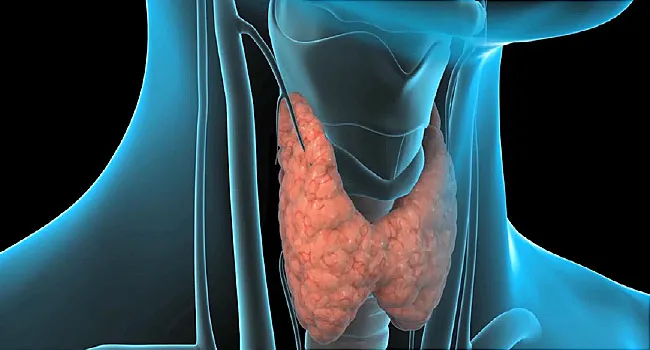
Graves' disease is "an immune system disorder that results in the overproduction of thyroid hormones," according to the Mayo Clinic.
From: https://www.webmd.com/a-to-z-guides/news/20180222/tv-host-wendy-williams-has-graves-disease?src=RSS_PUBLIC
Too Much TV Could Boost Your Odds for a Blood Clot
The study found that people who spend too much time in front of the TV are at increased risk for blood clots in their veins -- a condition called venous thromboembolism (VTE).
From: https://www.webmd.com/dvt/news/20180222/too-much-tv-could-boost-your-odds-for-a-blood-clot?src=RSS_PUBLIC
New Research Debunks Two Medical Marijuana Myths
The impact of marijuana legalization also has been minimal on the risk for fatal overdosing among adult users of opioid pain medications, a separate study team has found.
From: https://www.webmd.com/a-to-z-guides/news/20180222/new-research-debunks-two-medical-marijuana-myths?src=RSS_PUBLIC
Exercising Yourself to Death: The Risk of Rhabdo
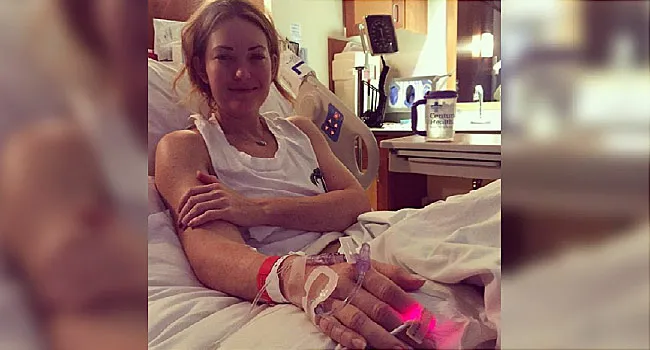
Rhabdomyolysis is a syndrome involving muscle breakdown and damage. When muscles are injured, they release their contents, including a muscle enzyme, into the bloodstream. The disorder is dangerous but rare. In one study, 22 people out of 100,000 were known to have it.
From: https://www.webmd.com/fitness-exercise/news/20180222/exercising-yourself-to-death-the-risk-of-rhabdo?src=RSS_PUBLIC
For Washington dentist, Give Kids A Smile is pure fun
From: By Kimber Solana
https://www.ada.org/en/publications/ada-news/2018-archive/february/for-washington-dentist-give-kids-a-smile-is-pure-fun
March JADA looks at severity of periodontal disease in meth users
From: By Michelle Manchir
https://www.ada.org/en/publications/ada-news/2018-archive/february/march-jada-looks-at-severity-of-periodontal-disease-in-meth-users
Aspirin A Good Clot Buster After Knee Replacement
Few patients in the study developed a blood clot after surgery, and those on aspirin fared just as well as those on rivaroxaban.
From: https://www.webmd.com/osteoarthritis/news/20180221/aspirin-a-good-clot-buster-after-knee-replacement?src=RSS_PUBLIC
Some antidepressants better than others, study says
From: http://www.cbsnews.com/news/antidepressants-really-work-study-confirms-some-better-than-others/
Mayo Clinic Emergency Helicopter Safety Training
From: Mayo Clinic https://www.youtube.com/watch?v=rfuimBGHuNs
Man's brain tumor could be the world's largest
From: http://www.cbsnews.com/news/santlal-pal-india-mans-brain-tumor-might-be-worlds-largest/
"Superagers" give clues to improving memory
From: http://www.cbsnews.com/news/superagers-give-clues-to-improving-memory/
FluMist May Be Coming Back. Will it Work Better?

FluMist, the inhaled flu vaccine, may be on its way back to doctors’ offices in the U.S. A CDC vaccine committee voted Wednesday to put the nasal spray back on its list of available vaccines.
From: https://www.webmd.com/cold-and-flu/news/20180222/flumist-may-be-coming-back?src=RSS_PUBLIC
Heavy Drinkers Put Themselves at Risk for Dementia
Overall, alcohol abuse was associated with a three times greater risk for all types of dementia. Alcohol was a factor in 57 percent of the 57,000 cases of early onset dementia, which is dementia that develops before age 65.
From: https://www.webmd.com/mental-health/addiction/news/20180222/heavy-drinkers-put-themselves-at-risk-for-dementia?src=RSS_PUBLIC
Antidepressants Do Work, Some Better Than Others
The researchers analyzed data from 522 trials -- published and unpublished -- that included more than 116,000 participants. Of the 21 antidepressants studied, all of them worked better than a placebo.
From: https://www.webmd.com/depression/news/20180222/antidepressants-do-work-some-better-than-others?src=RSS_PUBLIC
Guns Still Found in Homes With Unstable Kids
Access to firearms in a home triples suicide risk among family members and doubles their risk of being murdered, according to a 2014 evidence review that combined data from 16 previous studies.
From: https://www.webmd.com/parenting/news/20180221/guns-still-found-in-homes-with-unstable-kids?src=RSS_PUBLIC
Mayo Clinic Minute: Preventing ACL injuries in female athletes
From: Mayo Clinic https://www.youtube.com/watch?v=BrP8-PjbtPA
Diet and depression
Just this week, I have seen three patients with depression requiring treatment. Treatment options include medications, therapy, and self-care. Self-care includes things like sleep, physical activity, and diet, and is just as important as meds and therapy — sometimes more…
In counseling my patients about self-care, I always feel like we don’t have enough time to get into diet. I am passionate about diet and lifestyle measures for good health, because there is overwhelming evidence supporting the benefits of a healthy diet and lifestyle for, oh, just about everything: preventing cardiovascular disease, cancer, dementia, and mental health disorders, including depression.
Diet and emotional well-being
Diet is such an important component of mental health that it has inspired an entire field of medicine called nutritional psychiatry. Mind-body medicine specialist Eva Selhub, MD has written a superb summary of what nutritional psychiatry is and what it means for you right here on this blog, and it’s worth reading.
What it boils down to is that what we eat matters for every aspect of our health, but especially our mental health. Several recent research analyses looking at multiple studies support that there is a link between what one eats and our risk of depression, specifically. One analysis concluded:
“A dietary pattern characterized by a high intake of fruit, vegetables, whole grain, fish, olive oil, low-fat dairy and antioxidants and low intakes of animal foods was apparently associated with a decreased risk of depression. A dietary pattern characterized by a high consumption of red and/or processed meat, refined grains, sweets, high-fat dairy products, butter, potatoes and high-fat gravy, and low intakes of fruits and vegetables is associated with an increased risk of depression.”
Which comes first? Poor diet or depression?
One could argue that, well, being depressed makes us more likely to eat unhealthy foods. This is true, so we should ask what came first, the diet or the depression? Researchers have addressed this question, thankfully. Another large analysis looked only at prospective studies, meaning, they looked at baseline diet and then calculated the risk of study volunteers going on to develop depression. Researchers found that a healthy diet (the Mediterranean diet as an example) was associated with a significantly lower risk of developing depressive symptoms.
So, how should I counsel my patients on diet? There are several healthy options that can be used as a guide. One that comes up again and again is the Mediterranean diet. Another wonderful resource for folks is the Harvard T. H. Chan School of Public Health website with an introductory guide to healthy diet.
The bottom line
The gist of it is, eat plants, and lots of them, including fruits and veggies, whole grains (in unprocessed form, ideally), seeds and nuts, with some lean proteins like fish and yogurt. Avoid things made with added sugars or flours (like breads, baked goods, cereals, and pastas), and minimize animal fats, processed meats (sorry, bacon), and butter. Occasional intake of these “bad” foods is probably fine; remember, everything in moderation. And, for those who are trying to lose weight, you can’t go wrong with colorful fruits and veggies. No one got fat eating berries or broccoli. Quality matters over quantity. And when it comes to what we eat, quality really, really matters.
Resources
Dietary patterns and depression risk: A meta-analysis. Psychiatry Research, July 2017.
Diet quality and depression risk: A systematic review and dose-response meta-analysis of prospective studies. Journal of Affective Disorders, January 15, 2018.
The post Diet and depression appeared first on Harvard Health Blog.
From: Monique Tello, MD, MPH https://www.health.harvard.edu/blog/diet-and-depression-2018022213309
How artificial intelligence is transforming medicine
From: http://www.cbsnews.com/video/how-artificial-intelligence-is-transforming-medicine/
Mayo Clinic Minute: What is spontaneous coronary artery dissection?
From: Mayo Clinic https://www.youtube.com/watch?v=s_OH578NXQU
WHO: The Two Polio Vaccines
From: World Health Organization https://www.youtube.com/watch?v=G0-98gJsVR0
Wednesday, February 21, 2018
Williams announces hiatus after Graves' disease diagnosis
From: http://www.cbsnews.com/news/wendy-williams-announces-3-week-hiatus-after-graves-disease-diagnosis/
Engineering Internship Experience at Mayo Clinic
From: Mayo Clinic https://www.youtube.com/watch?v=EWoFzYnsMhs
Engineering Internship Experience at Mayo Clinic
From: Mayo Clinic https://www.youtube.com/watch?v=zxsjvP9LLME
Engineering Internship Experience at Mayo Clinic
From: Mayo Clinic https://www.youtube.com/watch?v=IReuW5Jhm3Q
Engineering Internship Experience at Mayo Clinic
From: Mayo Clinic https://www.youtube.com/watch?v=fjsfRGNkU-4
Engineering Internship Experience at Mayo Clinic
From: Mayo Clinic https://www.youtube.com/watch?v=r5GBkJrAcwY
FDA Cracks Down on Kratom Products

Kratom -- a plant that grows in Asia -- poses serious health risks, according to the FDA. Earlier this month, the agency declared that kratom acts like an opioid in the human brain.
From: https://www.webmd.com/drug-medication/news/20180221/fda-cracks-down-on-kratom-products?src=RSS_PUBLIC
Some In Pain Can Cut Opioids and Still Get Relief
The researchers found that length of time on opioids didn't affect people's success at reducing the drugs. Neither did the dose they took prior to the study.
From: https://www.webmd.com/pain-management/news/20180221/some-in-pain-can-cut-opioid-and-still-get-relief?src=RSS_PUBLIC
Blacks May Face Higher Stroke Risk From AFib
New research finds that the risk of stroke is much higher in black Americans with afib than in whites with the condition.
From: https://www.webmd.com/heart-disease/atrial-fibrillation/news/20180221/blacks-may-face-higher-stroke-risk-from-afib?src=RSS_PUBLIC
Special issue of Dental Practice Success features award-winning dental office designs
From: https://www.ada.org/en/publications/ada-news/2018-archive/february/special-issue-of-dental-practice-success-features-award-winning-dental-office-designs
Too many selfies? You may have "selfitis"
From: http://www.cbsnews.com/news/too-many-selfies-you-may-have-selfitis/
Google Retina Scan May Reveal Heart Attack Risk

For the study, the researchers used models that were based on data from 284,335 patients and validated using two separate data sets of 12,026 and 999 patients.
From: https://www.webmd.com/heart-disease/news/20180221/google-retina-scan-may-reveal-heart-attack-risk?src=RSS_PUBLIC
Could Hackers Target Heart Devices?
But hacking a cardiac device isn't just the stuff of fiction. It's a potential possibility -- though remote at this time -- that must be guarded against to protect patients, a new review suggests.
From: https://www.webmd.com/heart-disease/news/20180220/could-hackers-target-heart-devices?src=RSS_PUBLIC
Rotating Night Shifts a Path to Diabetes
The more often a person worked an irregular night shift, the greater their risk for type 2 diabetes, the findings showed.
From: https://www.webmd.com/diabetes/news/20180220/rotating-night-shifts-a-path-to-diabetes?src=RSS_PUBLIC
Dr. Google: The top 10 health searches in 2017
Follow me on Twitter @RobShmerling
Ever wonder what other people are wondering about? I know I do.
So, here are the top 10 health searches in Google for 2017. And just so you don’t have to look each one up, I’ve provided a brief answer. You’re welcome.
1. What causes hiccups?
I was surprised this one made it to the top 10 list of health searches. Maybe this search is common because hiccups are as mysterious as they are universal. I’ve written about hiccups before, but let’s just say the cause in any individual person is rarely known or knowable. Then again, the reason hiccups stop is also unknown.
Some triggers include an overly full stomach, drinking too much alcohol, sudden changes in temperature, smoking cigarettes, excitement, stress, or other heightened emotions. More rarely, they are caused by a specific, identifiable disease, such as thyroid enlargement, a tumor in the neck, or kidney failure.
2. What can I do to stop snoring?
It’s easy to see why this one might be high on the search list. And my guess is that the person googling this question is more often the bed partner, not the snorer. Common recommendations to reduce or eliminate storing include:
- Change body position (by elevating the head of the bed or sleeping on your side).
- Lose excess weight.
- Cut back on (or cut out) alcohol consumption.
- Reduce or avoid nasal congestion (by treating allergies, using a humidifier, anticongestion medications, or sinus rinses).
- Avoid medications (such as diazepam [Valium]) that relax muscles around the airway.
- Use an antisnoring device (whether over-the-counter solution or one recommended by your doctor or dentist).
3. What causes kidney stones?
It has been said that kidney stones cause more pain than almost any other disease. So anyone suffering from kidney stones has a strong incentive to avoid the next one. The most common causes and risk factors include
- kidney disease that alters how the body processes calcium
- urinary tract infection with certain bacteria
- certain dietary habits, such as eating a lot of sodium and not drinking enough fluid
- genetic tendency (as kidney stones can run in families)
- digestive conditions that affect nutrient absorption (such as chronic diarrhea or previous gastric bypass surgery)
- certain medications (such as acyclovir and triamterene)
- certain diseases (such as obesity, gout, and high blood pressure).
4. Why am I so tired?
This is a tough one because there are so many causes of tiredness and even the term “tired” can mean many different things including fatigue, lack of energy, sleepiness, weakness, and so on. Here are some of the most common causes of feeling tired
- an infection, such as the flu or pneumonia
- heart failure
- sleep apnea
- an underactive thyroid (hypothyroidism)
- liver disease (including hepatitis or cirrhosis)
- anemia
- a rheumatologic condition, such as rheumatoid arthritis
- depression or anxiety
- a side effect of a medication or drug
- chronic fatigue syndrome (in which the true cause is unknown)
Although there are many reasons for significant fatigue, the cause is frequently unknown (even after extensive evaluation).
5. How long does the flu last?
The average, uncomplicated influenza infection lasts about 5 days. However, it’s not rare for symptoms to last a week or more.
6. What is normal blood pressure?
Until recently, 120/80 or less was considered a normal blood pressure and 140/90 or higher was considered high blood pressure (hypertension). Intermediate readings were considered “elevated blood pressure” but not high blood pressure.
However, in November of 2017, the American Heart Association and the American College of Cardiology revised their guidelines to include 130/80 or higher as indicative of hypertension. As with all measures related to human bodily function, there is a range of normal. A blood pressure of 100/60 might be normal for a young, healthy adult but it might be too low for an elderly adult who is dizzy whenever he or she stands up.
7. How to lower cholesterol?
Ways to lower cholesterol include:
- Change your diet by avoiding foods high in saturated fat such as red meat, cheese, and fried foods.
- Lose excess weight.
- Increase physical activity.
- Take prescribed medications.
8. What causes high blood pressure?
In most cases, no specific cause can be found. However, risk factors and triggers include
- dietary factors (such as a high sodium diet or high alcohol consumption)
- advancing age
- excess weight
- genetic factors
- ethnicity (For example, hypertension tends to be more severe, start sooner, and occur more commonly among blacks.)
- kidney and vascular disease
- a sedentary lifestyle
- certain medications (such as anti-inflammatory and decongestant drugs, and illicit drugs such as cocaine)
- sleep apnea.
9. What is ADHD?
“ADHD” stands for attention deficit hyperactivity disorder and refers to a condition in which a person finds it difficult to concentrate, focus, or sit still. This can lead to poor decision making, struggles in school or work, and difficulty maintaining relationships.
10. What is lupus?
The term “lupus” includes a number of conditions, though it usually refers to “systemic lupus erythematosus,” a condition in which the immune system appears to react against tissues throughout the body. This may lead to inflammation in the skin, joints, heart and lungs, kidneys, brain, and other parts of the body. The cause is unknown and treatment usually involves suppressing the immune system.
Anything else?
If your question isn’t on this list, the Internet might have your answer. But, be aware that not all information on the web is reliable. I generally recommend websites affiliated with major medical centers or run by academic institutions (and be wary of those trying to promote a specific product or procedure). As always, if you have a specific question or concern about your health, it’s usually best to ask your doctor.
The post Dr. Google: The top 10 health searches in 2017 appeared first on Harvard Health Blog.
From: Robert H. Shmerling, MD https://www.health.harvard.edu/blog/google-top-10-health-searches-2017-2018022113300
Billy Graham, 'America's Pastor' Dies at 99

Internationally known evangelist Billy Graham, a counselor to presidents had been treated for cancer, pneumonia and other ailments before his death at 99.
From: https://www.webmd.com/a-to-z-guides/news/20180221/billy-graham-americas-pastor-dies-at-99?src=RSS_PUBLIC
Rheumatoid Drug No Help To Arthritis Patients
According to the researchers behind the new study, hand osteoarthritis affects up to 31 percent of people over 70 and up to 15 percent of those older than 60.
From: https://www.webmd.com/osteoarthritis/news/20180221/rheumatoid-drug-no-help-to-arthritis-patients?src=RSS_PUBLIC
Peanut protein powder shows potential for treating allergies
From: http://www.cbsnews.com/video/peanut-protein-powder-shows-potential-for-treating-allergies/
Peanut protein powder a solution for those suffering from allergies?
From: http://www.cbsnews.com/news/peanut-allergies-treatment-aimmune-protein-powder/
Tuesday, February 20, 2018
Woman says hospital declared her living husband dead
From: http://www.cbsnews.com/video/woman-says-hospital-declared-her-living-husband-dead/
Mayo Clinic Center for Innovation: Thinking Differently Speaker Series, Doug Powell
From: Mayo Clinic https://www.youtube.com/watch?v=_x7KLsPtV8E
Mayo Clinic Minute: What is Spontaneous coronary artery dissection?
From: Mayo Clinic https://www.youtube.com/watch?v=s_OH578NXQU
Mayo Clinic is strong, well-positioned for future; leadership transition begins
From: Mayo Clinic https://www.youtube.com/watch?v=D3CSACK1PKs
Peanut Allergy Treatment Shows Promise in Study

By the end of the study, 67 percent of the participants who took the peanut flour were able to tolerate the equivalent of roughly two peanuts, compared with only 4 percent of those who took the placebo.
From: https://www.webmd.com/allergies/news/20180220/peanut-allergy-treatment-shows-promise-in-study?src=RSS_PUBLIC
Herbal Drug Kratom Linked to Salmonella, CDC Says

Kratom grows naturally in the Southeast Asian countries of Thailand, Malaysia, Indonesia and Papua New Guinea. It has been sold as a dietary supplement -- typically to help manage pain and boost energy.
From: https://www.webmd.com/a-to-z-guides/news/20180220/herbal-drug-kratom-linked-to-salmonella-cdc-says?src=RSS_PUBLIC
The High Cost of Surviving Rabies
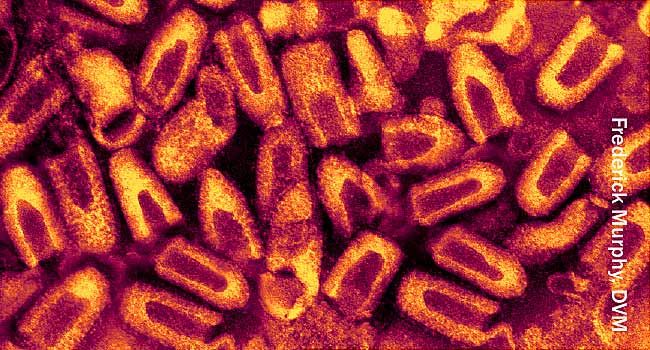
The price of rabies treatment has skyrocketed nearly 400% over the past decade, leaving some patients with bills in the tens of thousands of dollars.
From: https://www.webmd.com/a-to-z-guides/news/20180220/the-high-cost-of-surviving-rabies?src=RSS_PUBLIC
Kratom linked to dozens of illnesses from salmonella
From: http://www.cbsnews.com/news/kratom-salmonella-fda-cdc-warning/
Newer Breast MRI May Be More Accurate and Easier
In a study in Germany, the new technique reduced false-positive findings by 70 percent. The scan was also able to detect 98 percent of breast cancers correctly, the researchers said.
From: https://www.webmd.com/breast-cancer/news/20180220/newer-breast-mri-may-be-more-accurate-and-easier?src=RSS_PUBLIC